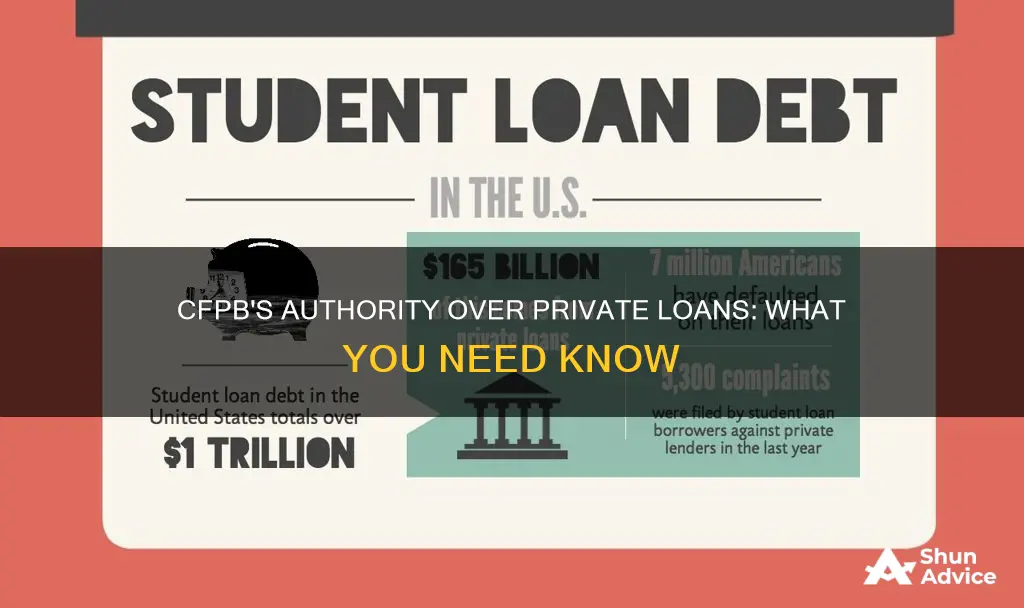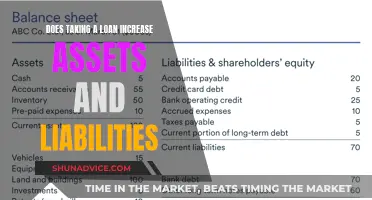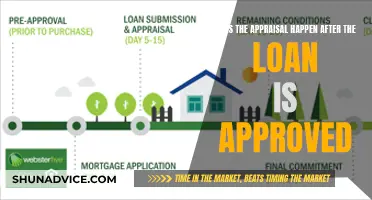
The Consumer Financial Protection Bureau (CFPB) is a U.S. government agency that ensures banks, lenders, and other financial companies treat consumers fairly. The CFPB enforces consumer financial protection laws and prescribes rules, orders, standards, and prohibitions. It also has supervisory authority over non-depository mortgage originators and servicers, payday lenders, and private student lenders of all sizes. The CFPB's rule-making process involves research and public input, and it carefully assesses the benefits and costs of regulations for consumers and financial institutions. The CFPB's regulatory agenda includes rules on consumer lending compliance, such as the Truth in Lending Act, Fair Debt Collection Practices Act, and Equal Credit Opportunity Act.
| Characteristics | Values |
|---|---|
| CFPB's jurisdiction | Depository institutions and affiliates, nondepository mortgage originators and servicers, payday lenders, and private student lenders |
| Supervision | Larger participants in consumer reporting, consumer debt collection, student loan servicing, international money transfer, and automobile financing |
| Rulemaking process | Research, public input (field hearings, consumer and industry roundtables, advisory bodies, small business review panels), assessment of benefits and costs, publication of proposed rules, support and resources for stakeholders |
| Regulatory agenda | Encourage consumer-beneficial competition, promote competition in financial services, respond to petitions for rule issuance, amendment, or repeal |
| Laws enforced | Alternative Mortgage Transaction Parity Act of 1982, Consumer Financial Protection Act, Consumer Leasing Act of 1976, Electronic Fund Transfer Act, Equal Credit Opportunity Act, Fair Credit Billing Act, Fair Credit Reporting Act, Fair Debt Collection Practices Act |
| Consumer protections | Access to the CFPB website, interpretations of consumer protections, elimination of abusive debt collection practices, consistent state action to protect consumers from debt collection abuses, clarification of prohibitions on harassment and abuse, false or misleading representations, and unfair practices in debt collection |
What You'll Learn

CFPB's jurisdiction over non-depository institutions
The Consumer Financial Protection Bureau (CFPB) has supervisory authority over non-depository institutions, including mortgage originators and servicers, payday lenders, and private student lenders of all sizes. The CFPB can also designate other non-depository institutions for supervision if there is reasonable cause to believe that the institution's conduct poses risks to consumers. This includes the power to prescribe rules requiring these institutions to file registration statements and keep records to assess compliance with federal consumer law, detect and assess risks to consumers and markets, and obtain information about their compliance systems.
The CFPB's jurisdiction over non-depository institutions is part of its broader authority to enforce consumer financial protection laws and ensure that banks, lenders, and other financial companies treat consumers fairly. This includes the power to investigate and obtain information about depository institutions' compliance systems and to coordinate examinations with prudential regulators for larger depository institutions. The CFPB also has the authority to supervise larger participants in consumer financial markets, as defined by CFPB rules, including consumer reporting, consumer debt collection, student loan servicing, international money transfer, and automobile financing.
In prescribing rules, the CFPB must consider the benefits and costs to consumers, the potential reduction of access to consumer financial products or services, and the impact on small depository institutions and rural consumers. The CFPB's authority to regulate non-depository institutions is established by the Dodd-Frank Wall Street Reform and Consumer Protection Act, which created the Financial Stability Oversight Council to serve as an early warning system for systemic risks to the US financial system.
Overall, the CFPB's jurisdiction over non-depository institutions is an important aspect of its mandate to protect consumers and ensure fair practices in the financial industry. By supervising these institutions and coordinating with other regulators, the CFPB helps to reduce risks to consumers and promote stability in the financial system.
HELOC Loans in Texas: What's Allowed and What's Not
You may want to see also

CFPB's supervisory authority
The Consumer Financial Protection Bureau (CFPB) is a U.S. government agency that ensures banks, lenders, and other financial companies treat consumers fairly. The CFPB enforces a number of consumer financial protection laws and prescribes rules, orders, standards, and prohibitions. The CFPB's supervisory authority extends to depository institutions and their affiliates, including banks. Additionally, the CFPB has jurisdiction over non-depository institutions, such as private student lenders, payday lenders, and mortgage originators and servicers.
The CFPB's supervisory authority is not limited to specific types of loans, including private loans. The CFPB has the power to regulate and supervise these non-depository institutions, which means it can oversee their activities and enforce compliance with consumer financial protection laws and regulations. This includes ensuring that these institutions do not engage in unfair and deceptive practices and that they comply with applicable laws, such as the Fair Debt Collection Practices Act, which prohibits debt collectors from using abusive or deceptive practices.
The CFPB's rule-making process is informed by research and public input, including field hearings, roundtables, and advisory bodies. The CFPB publishes proposed rules and invites comments from the public, industry, and other stakeholders to ensure that regulations are effective and beneficial to consumers. Once a regulation is in place, the CFPB provides support and resources to help institutions understand and comply with the rules.
The CFPB's supervisory authority also extends to larger participants in certain consumer financial markets, as defined by CFPB rules. These markets include consumer reporting, consumer debt collection, student loan servicing, international money transfer, and automobile financing. The CFPB can designate non-depository institutions for supervision if there is reasonable cause to believe that their conduct poses risks to consumers. This flexibility allows the CFPB to adapt to changing market conditions and protect consumers in various financial sectors.
TaxAct's Refund Anticipation Loans: What You Need to Know
You may want to see also

Consumer protection laws
The Consumer Financial Protection Bureau (CFPB) is a U.S. government agency that ensures banks, lenders, and other financial companies treat consumers fairly. The CFPB has supervisory authority over non-depository mortgage originators and servicers, payday lenders, and private student lenders of all sizes. It also supervises larger participants in other consumer financial markets, including consumer reporting, debt collection, student loan servicing, international money transfer, and automobile financing.
The CFPB enforces various consumer financial protection laws, such as the Consumer Financial Protection Act, the Consumer Leasing Act of 1976, the Electronic Fund Transfer Act, and the Fair Credit Billing Act. The bureau also enforces the Fair Debt Collection Practices Act (FDCPA), which aims to eliminate abusive debt collection practices and promote consistent state action to protect consumers from debt collection abuses. The FDCPA prohibits abusive, deceptive, or harassing debt collection practices and applies to consumer debt for personal, family, or household expenses, including credit card debt, car loans, student loans, and medical debt.
Other consumer protection laws include the Fair Credit Reporting Act (FCRA), which helps consumers maintain accurate credit histories and protect their creditworthiness. The FCRA gives consumers the right to understand how their credit report information is used and allows them to dispute or freeze their credit report. The Truth in Lending Act (TILA) requires lenders to provide clear and transparent information about the terms and costs of credit, including annual percentage rates (APR) and repayment terms. TILA also provides information on identifying violations and determining appropriate corrective actions.
Additionally, the Equal Credit Opportunity Act (ECOA) prohibits lenders from discriminating against consumer applicants based on race, colour, religion, national origin, sex, marital status, age, or public assistance receipt. The CARD Act protects consumers from sudden interest rate hikes, unreasonable fees, and inflated late payment fees. The Housing Mortgage Disclosure Act (HMDA) requires mortgage lenders to report data on their lending practices, helping to identify discriminatory lending practices. These laws empower consumers and protect them from unfair practices in the financial market.
Tesla Loan Prepayment: Penalty or Peace of Mind?
You may want to see also

CFPB's rulemaking process
The Consumer Financial Protection Bureau (CFPB) has a rulemaking process that typically starts with research and is informed by public input. This includes field hearings, consumer and industry roundtables, advisory bodies, and small business review panels. The CFPB carefully assesses the benefits and costs of the regulations they are considering for consumers and financial institutions.
The CFPB publishes proposed rules to give industry, consumers, and other external stakeholders an opportunity to comment on their potential impact. The CFPB also publishes notices requesting public comment on a variety of documents, including proposed rules and requests for information. The public does not need to be experts or lawyers to give comments, and the CFPB invites everyone to share their views. The CFPB also works with community banks and credit unions to ensure consumers have a choice of products, services, and financial relationships.
The CFPB has an ex parte policy that requires public disclosure of ex parte presentations made to CFPB staff concerning pending rulemaking. This ensures that the general public will have access to the input that the CFPB is receiving. At the beginning of a rulemaking process, CFPB staff will typically receive suggestions and information from a variety of stakeholders, which helps inform the drafting of a proposed rule.
The CFPB is currently considering rules for nonbank personal loans, including buy now, pay later (BNPL) loans, earned wage access, and other financial products. The CFPB has acknowledged concerns about an unlevel playing field in the market for personal loans and is considering new rules that would bolster the supervision of nonbank providers of personal loans.
Borrowing from Your 401(k): Withdrawal or Loan?
You may want to see also

CFPB's regulatory agenda
The Consumer Financial Protection Bureau (CFPB) is a U.S. government agency that ensures banks, lenders, and other financial companies treat consumers fairly. The CFPB's regulatory agenda includes a range of activities aimed at achieving this goal.
The CFPB publishes an agenda of its planned rulemaking activities twice a year. This agenda includes the CFPB's active rulemaking plans, such as pre-rule, proposed rule, and final rule activities, as well as a list of completed actions from the previous six months. The CFPB's rulemaking process typically starts with research and is informed by public input, including field hearings, consumer and industry roundtables, advisory bodies, and small business review panels. The CFPB encourages public participation by publishing notices requesting comments on proposed rules and other documents. Anyone can share their views, and the CFPB carefully assesses the benefits and costs of potential regulations for consumers and financial institutions.
The CFPB's regulatory agenda covers a wide range of topics related to consumer financial protection. For example, the CFPB proposes to amend Regulations E and Z to update regulatory exceptions for overdraft credit provided by very large financial institutions. The CFPB is also seeking to establish quality control standards for the use of automated valuation models by mortgage originators and secondary market issuers in determining the collateral worth of a consumer's principal dwelling. Additionally, the CFPB wants to address how the Truth in Lending Act applies to Property Assessed Clean Energy (PACE) financing transactions. The CFPB also has supervisory authority over nondepository mortgage originators and servicers, payday lenders, and private student lenders of all sizes.
The CFPB's regulatory agenda is designed to make rules governing consumer finance markets more effective and to create new rules when necessary. The CFPB works with the Small Business Review Panel on rules that could have significant economic impacts on small entities. The CFPB also responds to petitions from interested persons for the issuance, amendment, or repeal of a CFPB rule, as required by the Administrative Procedure Act. Overall, the CFPB's regulatory agenda aims to promote competition in financial services and ensure fair treatment of consumers by financial institutions.
Loans and Unemployment: Impact and Influence Explored
You may want to see also
Frequently asked questions
The CFPB is the Consumer Financial Protection Bureau, a U.S. government agency that ensures banks, lenders, and other financial companies treat consumers fairly.
Yes, the CFPB has supervisory authority over non-depository private student lenders of all sizes. The CFPB also has supervisory authority over payday lenders.
The CFPB has supervisory authority over depository institutions and their affiliates, non-depository mortgage originators and servicers, and larger participants in other consumer financial markets as defined by CFPB rules. These include consumer reporting, consumer debt collection, student loan servicing, international money transfer, and automobile financing.
The CFPB's rulemaking process starts with research and is informed by public input, including field hearings, consumer and industry roundtables, advisory bodies, and small business review panels. The CFPB assesses the benefits and costs of regulations for consumers and financial institutions and publishes proposed rules for input from stakeholders. Once a regulation is in place, the CFPB provides support and resources to help stakeholders comply.
The CFPB enforces a number of consumer financial protection laws, including the Consumer Financial Protection Act, the Fair Credit Reporting Act, the Fair Debt Collection Practices Act, and the Equal Credit Opportunity Act, among others.







